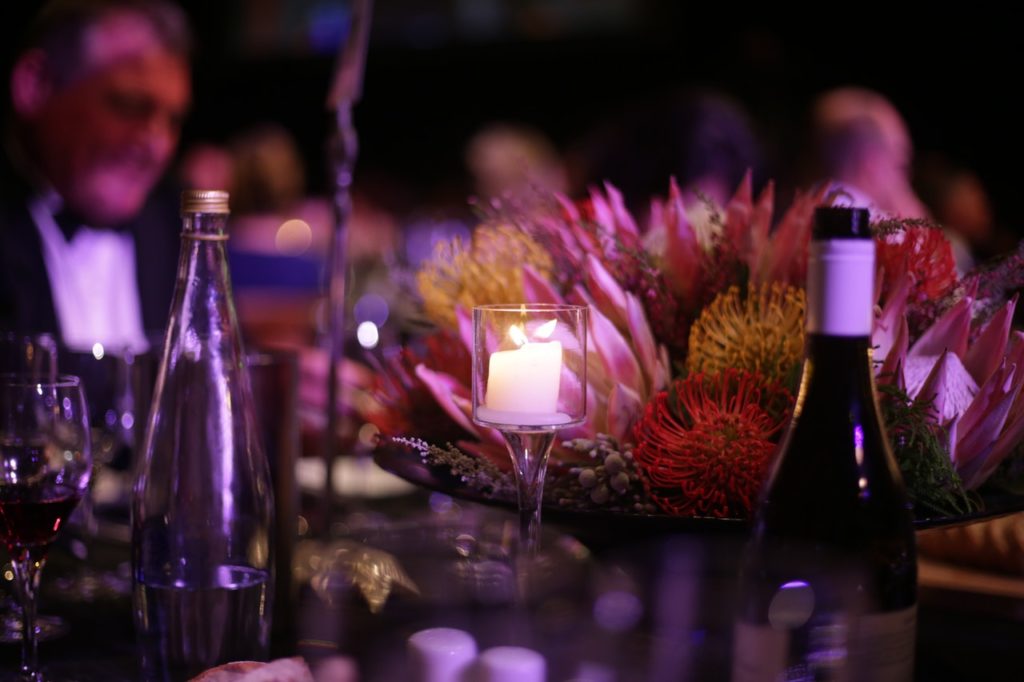Charity balls are a fantastic opportunity for charities to raise a large amount of money in one evening. Ticket prices are high, and there are plenty of fundraising opportunities during the event too. Though charity balls can take a lot of organisation, time and initial investment, the ROI can be significant.
23% of donors gave to charity through attending a fundraising event in the past 12 months. A further 40% donated to a raffle or lottery. There is a big opportunity for charities and event organisers to put their fundraiser on the map and raise a large amount of cash.
Nikki Ayrton, Fundraising Executive at Age UK Calderdale and Kirklees, says “Gala or ball fundraisers are effective as they bring together everyone who has an interest in the charity, and allows charities to raise their profile. They also provide a great opportunity to raise funds.”
But why should you consider organising a charity ball, and how exactly should you approach planning and managing the event?
People appreciate great experiences
The Experience Economy is affecting almost every sector. People are more likely to attend events that provide a memorable and unique experience that simply can’t be replicated. That’s why spectacular charity gala dinners and balls are growing in popularity.
However, the experience must be unforgettable. Event organisers can’t get away with a budget buffet, bunting and a local band for entertainment. Part of the appeal of fundraising balls, galas and awards is the glitz and glamour of the event. Guests want a VIP experience and expect to pay a premium for something a little special.
Event organiser Roberta Sabbatini says: “It is fundamental to know the demographic of the guests: their age, interests; their pain points. This information will enable the organiser to tailor their event to their guests.”
Cancer Research UK holds several high-profile events throughout the year to raise funds. With some events hosted by Ronan Keating and artwork from the likes of Banksy and Damien Hirst up for auction, it’s fair justification that tickets to these events cost upwards of £600. Local event organisers could take note and invite prolific local celebrity guests to host the event, perform or simply attend and help promote the ball.
Jon Fellows of Last Minute Musicians says: “People want to go out, have fun and enjoy themselves. Being able to channel that into a worthwhile cause is usually the key to a successful event. If you can present people with something different that will pique their interest, you’re onto a winner.”

Choose the right time of year
People are more likely to donate to charity in November and December, so winter balls or Christmas events could encourage higher donations. Consumers expect winter events to come with a higher price point, which allows you to raise more money and appeal to Christmas parties or families looking for a festive get together opportunity.
However, don’t underestimate the impact of an event happening at a ‘quiet’ time of year. This could give guests an opportunity to get out and about socialising at an otherwise quiet time in their calendar. Be mindful to start promoting your event in plenty of time though – people are likely to be away over the summer or preoccupied with Christmas so you’ll need to ensure your event doesn’t slip under the radar.
Themed events also go down a treat. A Burns Night Ceilidh, Valentine’s Day masquerade ball or summer party could encourage guests to attend. Regular donors will be excited by the unique theme, and it could also encourage first-time guests to come along too.
Make sure you check your events calendar thoroughly. Avoid important sporting events or national days. You should also consider your own limitations. Look at your work calendar and check your team’s plans to make sure you have enough time and resource to make the event happen successfully at a certain time of year.
Getting the price point right
Stats show that fewer people are giving money to charity, though those who do donate are often giving higher amounts. This perhaps shows that instead of regularly participating in charitable activities, people are choosing to participate sparingly (but giving a more significant sum when they do).
Do some competitor research and find out how much other charities in your local area are selling gala tickets for. Try not to sell yourself short or price yourself out of the market. Generally tickets to local charity fundraisers are between £40 – £100 but this can increase depending on what’s on offer.
Keeping your own costs low will help to bring the ticket price down too. Try to get as much donated / discounted as you can (such as the venue, prizes and decorations). If you can achieve sponsorship that’s even better – why not approach a local business and ask if they can sponsor the welcome drinks in return for brand promotion? You could also ask businesses to sponsor each course of the dinner, or sponsor the dancefloor or DJ! Make sure you offer businesses plenty of promotion in return.
Jon Fellowes continues: “While it is important to note that absolutely no one should be asked to work for free at charity events, many pro bands will offer a charity rate or discount, especially for anything that is close to their heart. It is also not unheard of for a band to donate some of their fee back into the pot at the end of the night, although this should never be automatically expected of them.”
Ultimately, your ticket sales should more than cover your costs. This leaves ample opportunity for you to raise money for the charity on the night without worrying about the money you’ve already invested.
Use online opportunities to raise even more cash
Offering guests options to donate could increase the money raised. Stats show over 8% of overall fundraising revenue (not including grants) is raised online. Make it easy for guests to buy their tickets to your ball online. You could even kick-start a silent auction online to allow people to take part even if they aren’t able to attend the event.
Choosing a trustworthy ticketing platform may help you to sell tickets. As many guests will be checking out your event on their mobile, make sure your chosen ticketing platform is mobile friendly. Brands such as Eventbrite are already established, which may reassure potential guests that their payment and information will be safe.
Start planning your event
You should make sure you plan your event basics at least nine months in advance:
- Bring together a planning committee and make sure everyone knows their roles and responsibilities (or arrange a specialist event agency or planner to help)
- Set the date
- Work out a clear budget. How much do you want to invest on your event? Our experts advise making a spreadsheet and reviewing it weekly to help keep on top of costs.
- Think of a fundraising plan. How much do you want to raise? Work backwards to decide how much you’ll need to charge per ticket, and any other activities you want to run (such as an auction)
- Decide on a theme and format for your event
- Book your venue. Make sure you visit the venue if you can and get a proper feel for the space available. You’ll also need to know what’s included in the price so you can budget for providing your own caterers, staff, décor, photographers etc if you need to
- Arrange your event insurance. Public Liability Insurance, Event Equipment Insurance and Event Cancellation Insurance will be necessary, as will Employers’ Liability Insurance if you’re hiring staff or volunteers to help at your event
- Start to contact large businesses and organisations who may be able to sponsor your event, donate prizes or book tables
- Arrange entertainment and get your line-up booked in! The more popular a band or performer, the more likely they are to get booked up in advance so don’t leave it too late
Deciding on a theme can be particularly important, as it could influence the venue you choose, your décor and even entertainment. Jon Fellowes of Last Minute Musicians says: “It’s important to have a strong theme that people can engage with easily and is appropriate for the type of event you’re holding. That said, there are several “classic” themes that tend to work well for certain types of events. For more formal events, James Bond, casino or the roaring 20s are, perhaps, the most obvious examples. Whatever your theme, it’s important to remember that you can reflect it in your choice of live music. Vintage or jazz bands are great for formal occasions, or tribute acts for popular decades.”

What entertainment to include at your charity ball
Live entertainment always goes down a treat at events. Musicians, singers, DJs and bands are a great way to get people up on the dancefloor and entertained throughout the evening. Plus, you can choose a style of music that suits your event.
Magicians, comedians, dancers and circus performers offer a more unusual style of event entertainment. You could also invite some celebrities to your event (or lookalikes for a quirky alternative). Consider who will host your event – you could employ a guest speaker, celebrity or comedian to compere or you could host the event yourself.
Fundraising activities could include old favourites such as an auction or silent auction. There are many unusual auction games you can try, which will engage guests and keep the fun flowing. Why not mix things up with a reverse auction (everyone stands and sits down if they aren’t prepared to pay a certain amount until you’re left with a winner)? You could also get the whole room involved with Heads or Tails. This breaks the ice and encourages a vibrant, welcoming atmosphere.
Nikki Ayrton says, “It’s about making the night fun for people. Putting on games and activities such as raffles, a tombola and auctions also helps raise extra money along with the event.”
An unusual activity is asking all guests to roll £1 coins nearest to a bottle or glass on their table. The winner of each table will win a small prize, with all pound coins donated to the charity. Each table could also have a “Banned Word Jar”, with a list of relevant and fun banned words attached. If a guest says a banned word then they have to put some money in the jar.
Tie in your décor with your fundraising by hosting a themed art exhibition. Local artists donate their work to your event, which offers them a free promotion platform. Guests can then buy the artwork displayed. A money maker and a cost-effective way to jazz up your venue!
Know you audience
Understanding what makes your audience tick and choosing live entertainment to match will ensure your guests have a great evening. John advises: “When it comes to having a packed-out dancefloor, there are a couple of simple tips that you can employ to help your act…
1. Don’t put the entertainment on too early. Through a combination of acclimatization and intoxication, the later into the evening, the more likely your guests are to get up and dance. Simple as that.
2. Get the venue to turn down or off the lights when your entertainment comes on. Obviously, this will be affected by the disco lighting that they have brought with them but, if possible, no one really wants to dance under the bright florescent office-type lighting that is sometimes provided in-house.”
Develop a marketing strategy and get going on promoting your event
If you want people to come to your event, they have to find out about it! Social media (particularly Facebook events) is a great place to start. You can run boosted posts to reach a larger volume of people, too. If you’ve got an email list then plan a thorough email marketing campaign to take you right up until the day of your event. You can start to gather an email list by asking attendees if they would be happy to be added to your newsletter as part of the registration process.
Don’t underestimate the power of traditional marketing, such as flyering or direct mail distribution. You should also contact the local press to tell them about your event.
You can also take a more personal approach. Ask friends, family and local businesses to buy tickets and expect the rest of your event planning committee to do the same. While you don’t want to rely too heavily on friends and family, they should be able to widen the net by sharing your event information with their networks too.
The main point to remember is be transparent with your marketing. Roberta Sabbatini says, “Giving out the right message is fundamental as the last thing you want is for your guests to be disappointed. Being crystal clear what the event is about, and what people should expect, is fundamental for a successful event. A combination of social media marketing and newsletters are usually the best way to market any event.”
If you realise your tickets aren’t going to sell, Nikki Ayrton advises “it is important to make a call to know when to cut your losses and don’t be afraid to call off an event if you are going to be at a huge loss. Charites can’t afford to take that risk.” That’s not to say organisers should give up without a fight – try a range of marketing techniques and find alternative ways to make your event work if you can. Even if you need to change to a smaller venue or change your theme, you should try to make your event a success before cancelling it.
Decide on the finer details
As your event swiftly approaches, you’ll need to start focussing on the little things that come together to make your event a success.
- Complete a thorough event risk assessment. This will help you to identify areas that could go wrong, and your solution for mitigating this risk. If you need help or advice on this, get in touch or check out our risk assessment templates
- Check the laws and regulations with regards to running raffles or auctions
- Organise a photographer and don’t forget to take a few photos of the event on the night yourself to post on social media!
- Print programmes and any other material you need on the night
- Confirm the menu with the venue, and report back any guest dietary requirements. Your venue will also need to know final ticket numbers
- Develop a clear structure and schedule for the event, including where staff/volunteers will be stationed
- Send out event confirmation to all attendees including all key information

Make sure your event runs smoothly on the night
Your staff, whether permanent employees, temp staff or volunteers, should have a clear idea of their role throughout the evening. Brief the team properly and make sure everyone feels prepared.
Test any audio and visual equipment, and conduct a final risk assessment / health and safety check. You should continually run health and safety checks throughout the night, too (to look out for any trip hazards or spillages).
Throughout the night, make sure you keep reminding guests of your charity. They should be gently reminded that everyone there is brought together to raise funds for a great cause. This will encourage them to donate. You should also make an announcement towards the end of the evening to thank your guests.
Keep your funds safe
It’s easy to get swept away in the hectic nature of organising an event. But don’t lose sight of your goal – to make money. Therefore, it’s important you keep that money safe.
If you are dealing with cash on the night (for last-minute ticket sales, raffle tickets etc), you’ll need a float and reliable members of your team on-hand to manage the cash. Make sure volunteers aren’t responsible for large amounts of money – regularly bank your takings into a safe. Two people should be present when counting money. So, when you’re taking money to the safe or counting up at the end of the night, this should always be done in pairs.
If you’ve paid upfront for your venue, entertainment and more, you should be able to cover costs from the event’s profits. Make sure you’ve kept a thorough record of your expenses so these can be easily claimed back later.
The legal bit
You need to keep your guests and employees safe throughout your event, and make sure your event follows relevant law and regulations.
You should consider:
- Getting permission from the local authority or property owner if you’re holding your event in a public place
- Always make attendees aware if you’re planning to take photos of guests at your event and give them the opportunity to not take part in this
- Arrange first aid support
- Ensure your venue or caterers are following Food Standard Agency guidelines
- Apply for a licence if you’re holding public collections or lotteries / raffles
- Stay on the right side of data protection and GDPR by keeping your guest’s information safe and never keep it longer than you need to
Be prepared for the ‘what ifs’
Accidents or unavoidable incidents can happen.
Jon Fellowes comments: “Preparation really is key to the smooth running of an event. It may sound a little glib, but some of the biggest problems on the day can often be the most obvious things that people have failed to consider, due to the overthinking of some minutiae details. Always keep one eye on the big picture. Try and think of the most likely scenarios for what could go wrong, and have a contingency plan in place for if they do.”
Whilst the chances of this happening is small, you should still make sure you’re covered financially. Event Insurance gives you peace of mind that, even if there’s an incident at your event or you’re forced to cancel, your costs will be covered and you won’t be left out of pocket. Your insurance won’t cover you for any estimated loss of donations / funds raised unless you can provide clear financial records of previous events and prove your cancelled event would have raised a similar amount.
For specific details check your Policy Wording. You can get a no obligation quote online with Insure Our Event or, if you’d rather chat to an expert about your event, give us a call.
Keep the momentum of your charity ball going after it’s ended
Whether your event’s a one-off or a regular / annual extravaganza you should consider your event after care.
- Organise a debrief with your staff, suppliers, contractors or volunteers to find out what went well and what could be improved next time. Make sure you keep note of this so you can refer back to it later
- Make sure you’ve thanked everyone, from donors through to businesses
- Shout loud and proud about your event and the money you’ve raised. Share the final amount raised on social media and with the press, along with photographs taken at the event
- If you can, announce the date of the next year’s event with an Early Bird discount for previous guests
Share your event plans with us!
We’re event insurance specialists, but we can also offer event planning advice and risk management expertise. We’d love to hear more about your event.
Thanks to our contributors

Jon Fellowes of Last Minute Musicians
LastMinuteMusicians.com is the UK’s leading live entertainment portal. Its Entertainment Directory Service provides a comprehensive, yet convenient way for you to source entertainment for your event, no matter how unique the occasion. Whatever your event, simply browse profiles, read reviews, listen to audio, watch videos and choose from a fantastic selection of the best musicians, bands, entertainers and related companies.
The best charity ball Jon’s ever been to…
“I once played at a great event for Bono’s charity ONE that was incredibly successful, as well as being so much fun that we ended up playing for over an hour longer than we were supposed to.
At the other end of the scale, I’ve also been involved in great charity events that took place on a local level, in the back room of a pub, that raised loads of money for their chosen cause and were terrific fun for all involved. Never be discouraged from organising an event because of scale. Sometimes the smallest of community initiatives can make a real difference.”

Roberta Sabbatini of Roberta Sabbatini
Roberta has over 15 years of experience as a party planner and designer, provides a wide variety of planning services, floral and organic balloon decorations. Together with her team, she can satisfy any requirement.
The best charity ball Roberta’s ever organised…
Children and animals have a special place in my heart. I’m often involved in charity events that help them. The best one was an event for a Caribbean Embassy which funded the construction of a new school. I felt we were doing something very special.

Nikki Ayrton, Fundraising Executive at Age UK Calderdale and Kirklees
Nikki is an experienced Fundraiser with many years’ experience working in the non-profit organization management industry. She currently works as a Fundraising Executive at Age UK, leading on the fundraising for Age UK Calderdale and Kirklees.
Why Nikki enjoys working for a charity…
“It is a very rewarding job, where every day is different and you know every task you carry out is helping others.”


